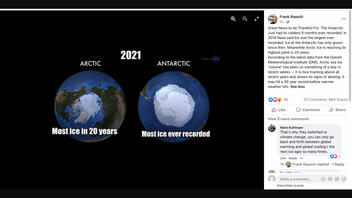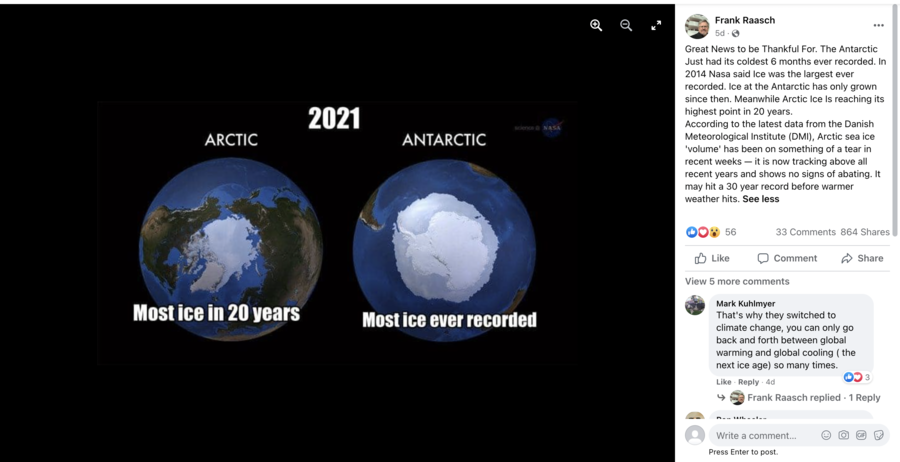
Did Arctic ice "just" reach its highest point in 20 years in December of 2021? No, that's not true: The article relied on for the claim was seven years out of date at the time the claim was posted. Up-to-date satellite records from the National Aeronautics and Space Administration (NASA), which monitors the ice in the Arctic, show significant declines since the satellites first began measuring in 1978. The last 15 years are the lowest the satellite has seen in its 43 years of recording. Since the 2014 article was published, the Antarctic ice has returned to average levels after a two-year uptick.
The claim appeared in a Facebook post (archived here) on November 27, 2021. It opens:
Great News to be Thankful For. The Antarctic Just had its coldest 6 months ever recorded. In 2014 Nasa said Ice was the largest ever recorded. Ice at the Antarctic has only grown since then. Meanwhile Arctic Ice Is reaching its highest point in 20 years. According to the latest data from the Danish Meteorological Institute (DMI), Arctic sea ice 'volume' has been on something of a tear in recent weeks -- it is now tracking above all recent years and shows no signs of abating. It may hit a 30 year record before warmer weather hits.
This is what the post looked like on Facebook at the time of writing:
Data collected by The National Aeronautics and Space Administration directly refute the claim as to Arctic ice. A September 22, 2021, article on the NASA website titled, "NASA Finds 2021 Arctic Summer Sea Ice 12th Lowest on Record," said:
Sea ice in the Arctic appears to have hit its annual minimum extent on Sept. 16, after waning in the 2021 Northern Hemisphere spring and summer. The summertime extent is the 12th lowest in the satellite record, according to scientists at the NASA-supported National Snow and Ice Data Center and NASA ...
The average September minimum extent record shows significant declines since satellites began measuring consistently in 1978. The last 15 years (2007 to 2021) are the lowest 15 minimum extents in the 43-year satellite record.
The article the Facebook post may have been referring to is from October 7, 2014. An editor's note underneath the title quickly debunks the claim that Arctic ice has been increasing recently:
Antarctica and the Arctic are two very different environments: the former is a continent surrounded by the ocean, the latter is ocean enclosed by land. As a result, sea ice behaves very differently in the two regions. While the Antarctic sea ice yearly wintertime maximum extent hit record highs from 2012 to 2014 before returning to average levels in 2015, both the Arctic wintertime maximum and its summer minimum extent have been in a sharp decline for the past decades. Studies show that globally, the decreases in Arctic sea ice far exceed the increases in Antarctic sea ice.
Lead Stories contacted the Danish Meteorological Institute. We will update this story, as appropriate, when they reply.



















